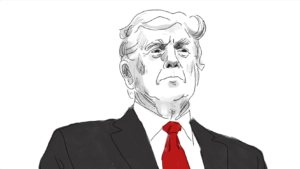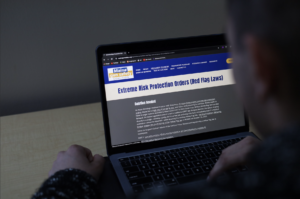On Sunday, Jan. 29, protesters around the country gathered at international airports to protest one of Donald Trump’s many executive orders: Protecting the Nation From Foreign Terrorist Entry into the United States. Over 150 people attended the Bangor International Airport protest, according to the event’s Facebook page.
Media outlets are reporting the temporary ban on immigration from Iran, Iraq, Libya, Somalia, Sudan, Syria and Yemen. The executive order also indefinitely suspends the United States Refugee Admissions Program.
Kyle W. Chick, a documentary photographer from Blue Hill, Maine, attended the protests for both professional and moral reasons. “I believe it was a deeply important day, not just in Maine, but globally, and I felt as though I should be there to document it. Personally, I was there to support human rights and stand up for what is important, our brothers and sisters. Trump’s move is based in fear and it seems like the precursor to more and more cultural division.”
The executive order in question requests that the Secretary of Homeland Security and Secretary of State make a report determining the information required for an individual to receive “any visa, admission, or other benefit under the INA.” The report would include a “list of countries that do not provide adequate information.”
This report is due thirty days after the release of the order. The order bars immigrants and nonimmigrants from entering the United States from countries listed in 217(a)(12) of the INA, 8 U.S.C. 1187(a)(12) which mentions Iraq, Syria and any country whose governments has supported terrorists multiple times. This is set to last for 90 days following the release of the Executive Order.
Trump’s executive order is pursuant to 8 U.S.C. 1182 (f). This 2016 amendment to the INA sections allows the president to, “for such period as he shall deem necessary, suspend the entry of all aliens or any class of aliens as immigrants or nonimmigrants, or impose on the entry of aliens any restrictions he may deem to be appropriate.”
Trumps order excludes diplomats and government officials; officials and employees of NATO; holders of C-2 visas which require the person to travel directly to “the immediate vicinity of the United Nations Headquarters District, Columbus circle, New York, NY.”; and holders of G-1, G-2, G-3 and G-4 visas which are issued to staff of “international organization entitled to enjoy privileges, exemptions and immunities as an international organization under the International Organizations Immunities Act.”
The 8 U.S.C. 1187 amendment was written in relation to 8 U.S. Code § 1182 (a)(7)(b)(i)(II). The former allows the Secretary of Homeland Security and the Secretary of State, on to disregard the restrictions of the latter. These restrictions are:
(7)(B)(i)(II) of section 1182(a); Any nonimmigrant who is not in possession of a valid nonimmigrant visa or border crossing identification card at the time of application for admission are ineligible to receive visas and ineligible to be admitted to the United States
There is, however, another list of requirements in 8 U.S.C. 1187 the Alien must fulfill to be eligible to have 8 U.S. Code § 1182 (a)(7)(b)(i)(II) disregarded.
Although 8 U.S.C 1187 Secretary of Homeland Security and Secretary of State, therefore, have the power to waive the requirements of 8 U.S. Code § 1182 (a)(7)(b)(i)(II). Section (a) paragraph 12 excludes aliens who have been present in Iraq, Syria and any country whose governments has supported terrorist groups multiple times after March 1, 2011, from this waiver.
The countries mentioned in 217(a)(12) of the INA, 8 U.S.C. 1187(a)(12) are the ones from which immigrants and nonimmigrants have been barred from entering the United states for the next 90 days.
After completing the report, Secretary of Homeland Security, Department of National Intelligence and the Secretary of State will request countries listed as not having the report-determined-level of adequate information to start providing such information. These countries will then have 60 days to begin providing the information before they are barred from Visas or INA benefits. Secretary of State or the Secretary of Homeland Security may continue to suggest countries “recommended for similar treatment.”
The Secretary of Homeland Security, Department of National Intelligence, FBI and the Secretary of State have been ordered to create a screening process, including in-person interviews, an ID database, new application forms and a processes to determine if an applicant is likely of “becoming a positively contributing member of society” or “has the intent to commit criminal or terrorist acts after entering the United States.”
The U.S. Refugee Admissions Program (USRAP) is suspended for 120 days. Secretary of Homeland Security, Department of National Intelligence and the Secretary of State will review the USRAP and add additional procedures. They will then determine the countries from which refugees will be accepted after the 120-day suspension. The order suspends Syrian refugees for an indefinite amount of time.
When the USRAP resumes, religious minorities will have priority if their reason for seeking refuge is religious persecution. No more than 50,000 refugees will be accepted in 2017. State and municipal governments will have a say in the placement of refugees.
The executive order also suspends the Visa Interview Waiver Program. The program allowed those renewing their visas within four years of expiration to skip in-person interviews.
The order requires the Secretary of State to expand the Consular Fellows Service and reevaluate nonimmigrant visa reciprocity agreements.
The order requests that the Secretary of Homeland Security and the Attorney General release to the public every 180 days: The Number of foreign nationals in the U.S. Charged with, convicted of, or deported because of Terrorism; cases of violence against women committed by foreign nationals; and estimated costs of the USRAP.
Washington State Federal Judge James Robart blocked the executive order on Feb. 3, claiming to make it legally void. Trump’s administration has the potential to appeal the case.












